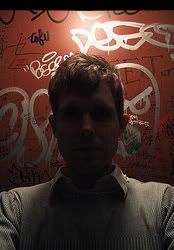INTERVIEW - "Forget About Being Liked," Says Chuck Palahniuk
 I spoke to Chuck Palahniuk the morning of the Gay Pride parade here in NYC, as I was getting dressed to attend a straight wedding. While I managed to fill a whole column with his comments on his upcoming move adaptations, a chunk of our conversation never made it to press. I'm not even going to tell you what he recommended I bring as a wedding present. However, here is the rest of our the interview, rescued from the cutting-room floor:
I spoke to Chuck Palahniuk the morning of the Gay Pride parade here in NYC, as I was getting dressed to attend a straight wedding. While I managed to fill a whole column with his comments on his upcoming move adaptations, a chunk of our conversation never made it to press. I'm not even going to tell you what he recommended I bring as a wedding present. However, here is the rest of our the interview, rescued from the cutting-room floor:
CP: One thing I try to impress on younger writers is that you shouldn’t be writing in order to be liked. You should be writing in order to be remembered. People’s tastes change over time, and if your work can stay in readers’ minds, long enough, eventually the general taste will switch around to your aesthetic. You’ve just got to create something that will stay in people’s minds until tastes come back around.
TB: Lovecraft was like that, his books were fiercely original and they weren't even published until after his death.
CP: ...And so many people who were selling then and making a great deal more money than him, their books are forgotten now! It is a really weird thing, but you just have to forget about being liked-- and accept that if there’s going to be a paycheck it’s going to be way down the road.
TB: Are there any movie monsters out there that you deeply sympathize with?
CP: In the 1981 film Hunger, I thought that Catherine Deneuve's character was despicable, but so seductive and so sympathetic. It’s one of those movies that when it came out, it was panned-- it was destroyed. People said it was two-hour perfume commercial, that it was garbage, that it was all soft-focus. Now people say “What a landmark movie!” It's the same as what I mentioned about writing; look at Harold and Maude, if you watched that film for the first time now, you’d have a hard time pegging what year it was made. It establishes its own authority. It’s the movies that do that which stay around forever.
TB: I'm reading Invisible Monsters right now and I was really struck by the opening chapter, which seems like a theatrical tableau. Are you inspired by theatre?
CP: I always really loved plays because plays have such finite resources in terms of time and people and setting and plays have to do everything with almost nothing; plays are very much like the style of minimalist writing. You use the same things over and over to greater and greater effect over the course of the story.
TB: I keep hearing mutterings about this Fight Club stage adaptation. Care to comment?
CP: I’ve committed to participating. It’s supposed to be a musical! Like a Broadway musical. David Fincher called me about that a couple of years ago; every time I think it’s dead, I hear from Fincher again. I guess he’s stringing me AND Trent Reznor along. I think 20th Century Fox has got someone gradually putting this whole thing together.
I always thought that straight guys' obsessions with Fight Club were always a little iffy considering the film's homoerotic subtext. Now we're luring them all to a big Broadway musical? Très subversive!










1 comment:
Mangelica
Post a Comment